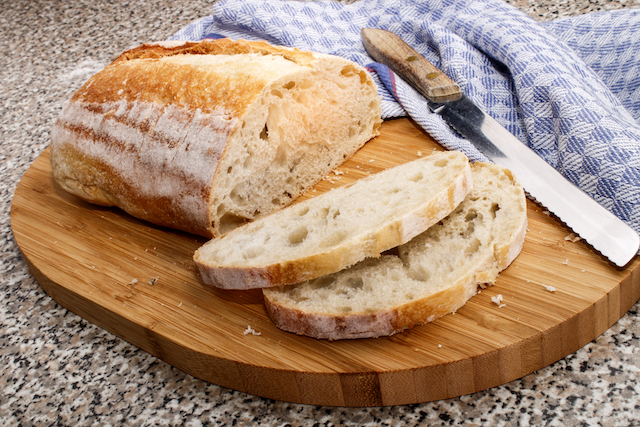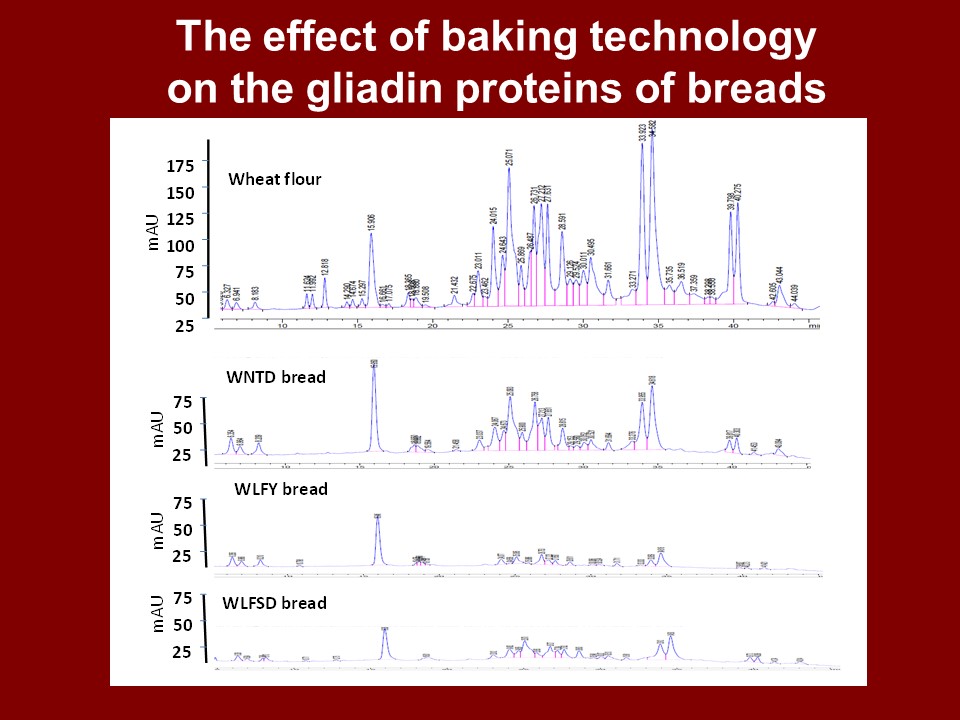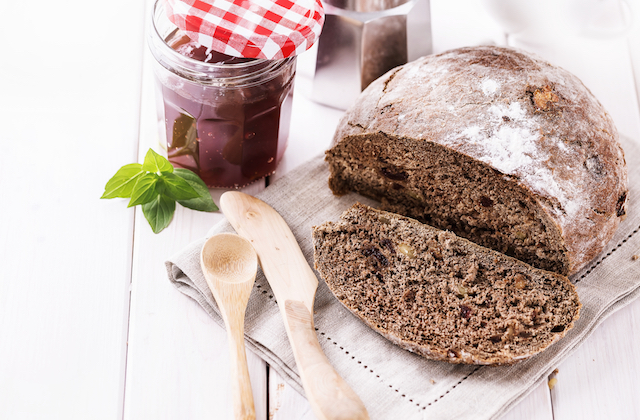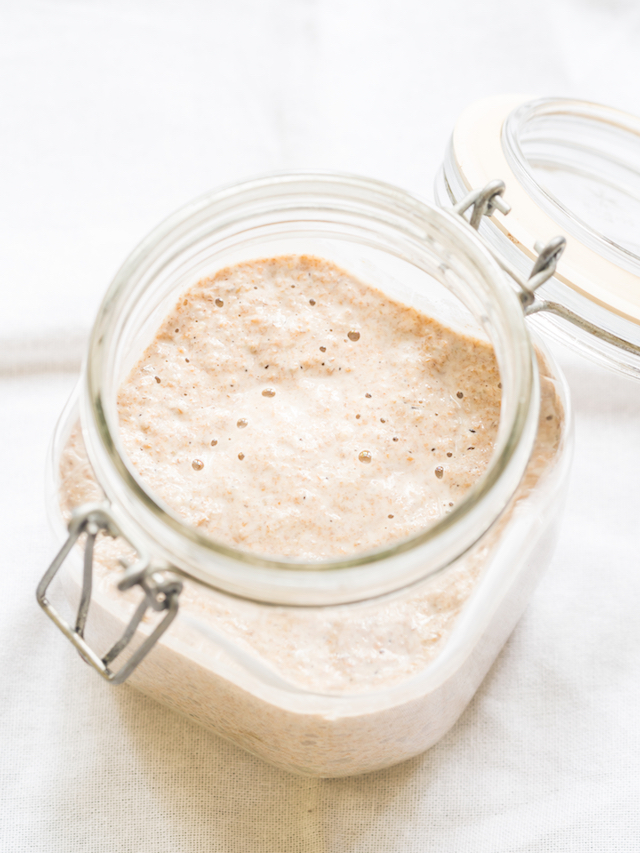- Home
- Blog
- Carbs, Sugars and Fibres
- The sourdough revolution
The sourdough revolution
Written by Catherine Saxelby
on Wednesday, 03 July 2019.
Tagged: bread, fermented foods, gluten, gluten intolerance, grains, healthy cooking, healthy eating, nutrition, sourdough

It’s no secret that I love bread! It’s my favourite carbohydrate, way ahead of potato, rice or pasta. So, it breaks my heart when I hear that people are giving up bread or forgoing any yeasted or wheat offerings at all. I understand there are those, like coeliacs, who just can’t eat bread but for others, sourdough may be the answer.
Why do people give up bread?
Sometimes because of gluten intolerance or sensitivity. Sometimes because they subscribe to a Paleo diet, Raw diet, Low Carb diet, or no-wheat Low-FODMAP diet.
It’s such a shame that the ‘staff of life’ has slipped into ill repute.
Sourdough may provide an answer for some
 The length of time of a sourdough ferments is an obvious point of difference between it and the supermarket loaf. What’s more, it is coming up as more and more important for human health. In his excellent book about wheat and baking, writer Stephen Yafa suggests that the traditional method of sourdough fermentation may end up being the answer to the anti-wheat sentiments and the problem of gluten.
The length of time of a sourdough ferments is an obvious point of difference between it and the supermarket loaf. What’s more, it is coming up as more and more important for human health. In his excellent book about wheat and baking, writer Stephen Yafa suggests that the traditional method of sourdough fermentation may end up being the answer to the anti-wheat sentiments and the problem of gluten.
I enjoyed this Pollan-esque book by Stephen Yafa, who is a non-scientist (which he declares) but smoothly blends nutrition, history and politics.

See the image above which compares the gliadin proteins in a wheat flour to the same flour baked via a rapid or no-time dough (WNTD) as well as two long-fermentation breads, one made with yeast (WLFY) while the other is made using sour dough (WLFSD). See how the peaks of each component are reduced by the longer time of fermentation. I have reproduced this here with permission from Drs Dai Suter and Frank Bekes who have amassed lots of interesting research into bread which you can see here.
Rather than the short fermentation time of less than 2 hours now employed by modern bakeries based on the Chorleywood method (adapted to the No-Time Dough method in Australia), a longer ferment of at least 12 hours but ideally 18 hours appears to confer many advantages. Some sourdoughs ferment even longer (up to 30 hours).
Another important difference with sourdoughs is that unlike conventional breads, which use a one pure strain of commercially produced baker’s yeast (Sacchromyces cerevisiae), the sourdough bread is produced using a mixed starter culture containing a range of different yeast and lactic acid bacteria. The composition of the starter culture can vary between different bakeries and contributes significantly to the flavour, aroma and crust character obtained.
What is the Chorleywood method?
The Chorleywood method became the way to bake in the 1970s when Australian bakeries took on this speedy British method which shortened the whole baking process to a few hours. In other words, it took around 2 hours from when the flour, yeast, salt and water were mixed into a dough until the bread travelled out of the bakehouse already sliced and wrapped!
At the time, I worked at the Bread Research Institute in Sydney educating groups on the value of bread and wheat in the diet and we often ran test runs for the bigger bakery groups to see what hiccups we could iron out. I well remember the Chorleywood process which was taken up with a frenzy by the factory bakeries, as it made the average loaf softer, reduced its cost and more than doubled its life. But like everything, these ‘improvements’ have come with a cost – to our health.
Thus, the answer to the woes now surrounding bread seems to be in the way it’s baked – I suggest you try a genuine sourdough bread made the long slow way BEFORE giving up all bread completely. It may just be the answer to your digestion and bowel troubles!
Where you can buy traditional sourdough in Sydney
 As far as I can see, there are six good sourdough bakeries in Sydney (in no special order):
As far as I can see, there are six good sourdough bakeries in Sydney (in no special order):
With two Sydney outlets at the beachside suburb of Bronte (145d Macpherson St and 49 Belgrave St) plus many restaurant contracts, Iggy’s sourdough bread hits the spot. Iggy’s specialises in sourdough, wholewheat and rye breads but be warned, they sell out fast!
Iggy’s Downunder was started by Yugoslavian-born Igor Ivanovic. He had previously worked delivering for a Boston bakery in the USA. He started baking in Australia in 2008 and “believes it’s the love and energy he puts in that creates the real difference in his products”, according to an interview with Broadsheet.
Sonoma’s website says that “in a loaf of Sonoma sourdough there's freshly-milled flour, filtered water, sourdough starter and sea salt. In the people who bake it there's passion and integrity.” Which pretty much spells out their philosophy on sourdough. The site also boasts that it takes “18 years, 36 hours to handcraft one loaf of Sonoma sourdough.”
In the 1940s, Sonoma founder, Kerry Connole, spent much of his time on visits to his grandparents in the NSW country town of Bellata at the bakery that adjoined their general store. He would watch the baker knead, stretch and shape dough, before baking it and producing golden loaves. Fast forward to 1997 and, on a whim, Kerry decided to lease that same old bakery for $1,000 per year. He and, his sons Andrew and Christian, restored it. One problem though, none of them knew how to bake! They just knew they wanted to. You can read more about the Sonoma story here.
Bowan Island claims to have pioneered “artisan sourdough baking in Australia over 30 years ago” They use a unique 80-year-old starter, as the cornerstone of their artisan sourdough collection.
David Cummings, the founder and managing director, started baking his own breads and pies in a small garage in Hunters Hill, selling the time-honoured products originally at Balmain and Glebe Markets before setting up his first baking enterprise on Lyons Road in Drummoyne.
Upon the success of this bakery, he expanded to Bowan Island Bakery’s flagship premises at Victoria Road in Drummoyne, which has since become a cherished part of the local community. You can find addresses for all their outlets here.
Their website says they use a 21-year-old sourdough starter and their wheats come from Gwydir Shire and southern Flinders region of South Australia. They run lots of sourdough classes. I have enrolled in one and was reminded again how long and complicated the sourdough process is. Something that’s best left to the experts.
More of a cake shop offering superb pies and tarts. Plus a little bread. They also have sourdough classes available.
Shop 6/274-290 Victoria St, Darlinghurst. Also, at Manly and Paddington.
I have been here. It was founded by a famous Sydney chef, Phillip Searle. He said he had been inspired by a classic Parisian bakery and “brought the ancient craft of ‘Levain’ baking traditions back to Darlinghurst.” The bakery is now operated by a brother and sister team William and Sophie Petersen. It’s more of a café and cake shop too. You can find them in Paddington, Manly and Darlinghurst.
Sourdough in other states and country areas
I’m sure there are many excellent sourdough bakeries around Australia – you will obviously know more about your own local area but wherever you live I can recommend trying out the local sourdough. It has more flavour than the mass-produced bread and it may just be better for your gut.
Quirky fact
 Did you know there is a sourdough library? Well there is and it’s in Belgium. They have more than 170 different starters, many with interesting stories. You can read more about it here, or watch a video about it here.
Did you know there is a sourdough library? Well there is and it’s in Belgium. They have more than 170 different starters, many with interesting stories. You can read more about it here, or watch a video about it here.
The bottom line
Clearly the length of time of a sourdough ferments is coming up as more and more important for human health. As that book by Stephen Yafa showed, around 18 hours is considered ideal but a minimum of 12 hours of slow fermentation can also produce good results.
So, it may not be the gluten (although there are clearly some people who can’t tolerate it) and it may not be the wheat with its fructans (the key carbohydrate compounds that appear to trigger flatulence and loose motions in sensitive people).
It may turn out to be the rapid fermentation process used by large bakeries which does NOT allow sufficient time for the yeasts to break down the proteins and starches in the dough. A fascinating theory.
Foodwatch
The Good Stuff
The Boring Stuff
© 2025 Foodwatch Australia. All rights reserved
Website by Joomstore eCommerce





